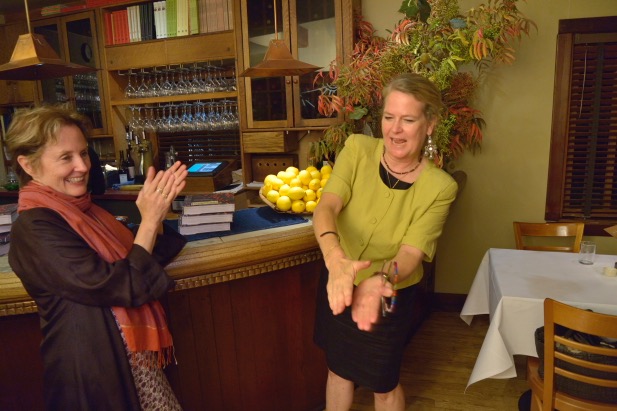I met Nancy Singleton Hachisu, author of Japanese Farm Food (Andrews McMeel, Fall 2012) late February at Marlow & Sons in Williamsburg.
We chatted for a short hour.
I have to thank a day with 2 car washes for finally bringing our conversation to this screen.
Q: Nancy, what makes you a “stubbornly” independent foreign bride?
I came to Japan when I was 32. I lived in Belgium for high school abroad program and I also spent a year in Mexico. While in Belgium, I stayed with a family. We were told by AFS High School Abroad program that we had to assimilate. When you come to a country as a visitor you follow local rules. In Japan, I felt like I needed to stay the course by following heart of customs not letter. As a foreign woman who settled in Japan and married a local man, I felt pressure from in-laws and also had to learn how to manage duties from farm life.
Q: Family roots?
Family has strong connections with MIT and Wellesley. My father worked at SRI. We had a Japanese inspired home.
Q: Your husband is an egg farmer, what type of chicken do you use and eggs they produce?
This is a commercial free range egg farm with 2000 to 3000 chicken, Rhode Island Reds. It takes craftsmanship to run which my husband has gathered over 20 years. You can taste difference in eggs depending on what they are fed with.
Q: Before studying at Stanford, you lived in Belgium for a year. Were you itching for a change of scenery even prior to heading for Japan?
Not really, I moved from northern California to southern California, center is my house and farm in Japan. When I travel, I like to go back to same places. I need a sense of place, a community.
Q: Was your English immersion program called ‘Sunny Side Up’ because of your roots as an egg farmer?
In part, mostly because it sounds much better than ‘Nancy’s English Club’.
Q: What is your role in ‘Slow Food Japan’?
We do farm related events. Food creates a sense of community. We show how easy it is to eat local.
Q: Describe recipes featured in your book.
Food in ‘Japanese Farm Food’ is what my family eats. Salads are my favorites.
Q: Can you name couple of must have kitchen tools in your daily cooking?
First, a vegetable knife (carbon steel) light and easy to handle for soft things, second, a grinding bowl and a grinder, good for western dishes and essential for Japanese cooking.
Q: Besides fact that you live on an egg farm, eggs seem present at various times of your life
Yes, in good times as in times of crisis, I think of eggs as the ultimate comfort food.
Q: Dango balls caught my eye in your book, what is their place?
Dango balls are for guests. In farming communities, they are served with soy sauce.
Q: What should be served with tea?
Sweet and savory foods are both present as well as canned coffee and carbonated drinks.
In many homes, food is not always seasonal and less and less homemade
Q: Last, describe region of Japan where you live in a few words.
Region is semi-rural with mostly small towns yet not as pastoral as Vermont
Thanks Nancy for your time!
(* Header image from Nancy Singleton Hachisu website)
